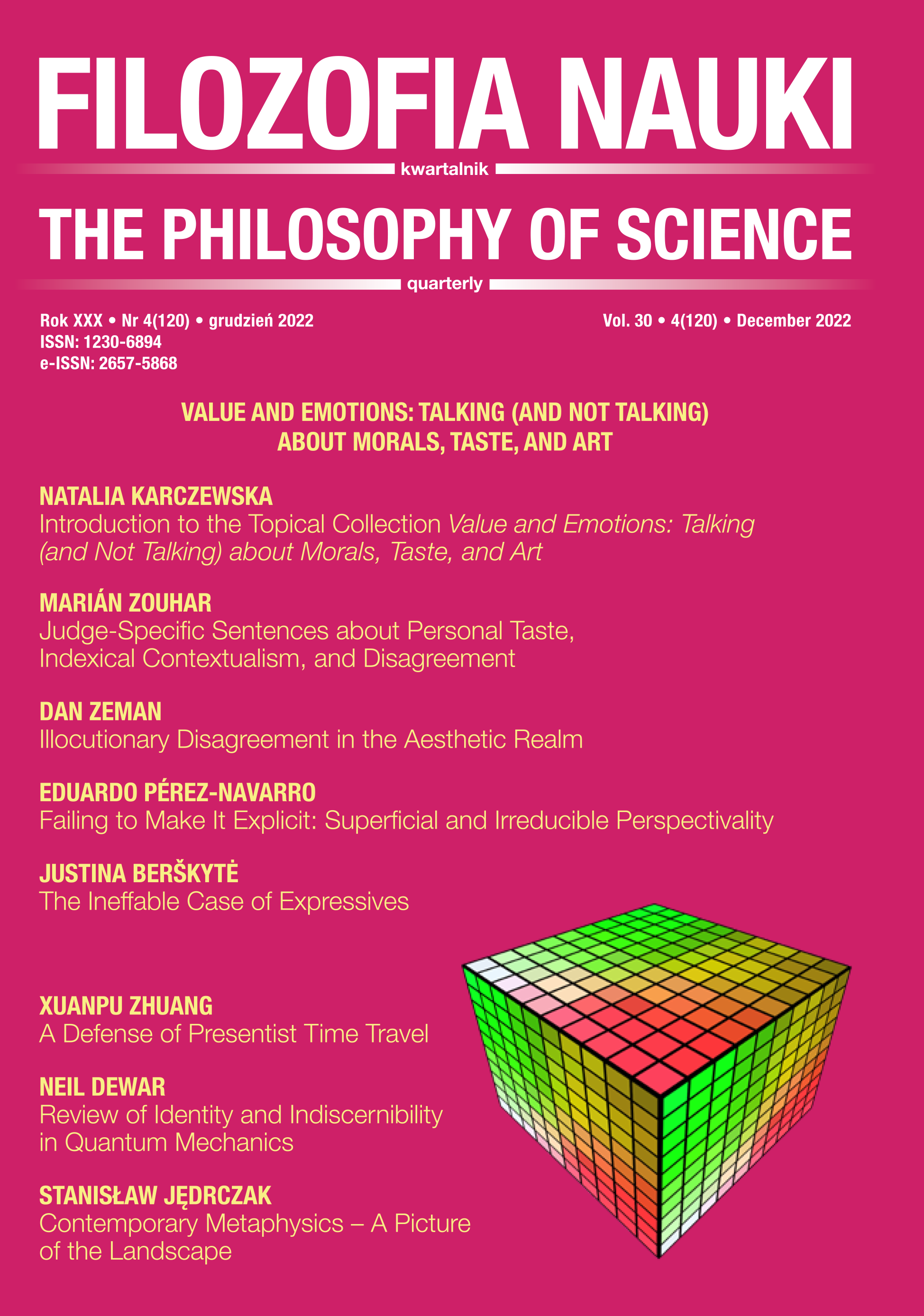Failing to Make It Explicit: Superficial and Irreducible Perspectivality
DOI:
https://doi.org/10.14394/filnau.2022.0033Keywords:
perspective, indexical contextualism, nonindexical contextualism, assessor relativism, John Perry, John MacFarlane, explicitizationAbstract
The aim of this paper is to explore what the different answers that might be given to the question about the role of perspective in language – indexical contextualism, nonindexical contextualism, and assessor relativism – amount to, using Perry’s work about thought without designation and thought without representation as our point of departure. In particular, I argue that Perry’s discussion of the possibility of making explicit the parameter on which the truth-value of a certain sentence depends provides us with a useful criterion to distinguish between indexical and nonindexical contextualism. Then, I show that some of MacFarlane’s insights can be seen as a continuation of Perry’s discussion. The most salient outcome of the comparison between Perry’s and MacFarlane’s frameworks will be the distinction between the superficial perspectivality that can be found in sentences like “It is raining” and the irreducible perspectivality that we find in sentences like “Licorice is tasty.” The apparently paradoxical conclusion will be that language is truly perspectival precisely when it does not encode a perspective.
References
Brandom R. (1994), Making It Explicit: Reasoning, Representing, and Discursive Commitment, Cambridge, Mass.: Harvard University Press.
Chrisman M. (2010), “From Epistemic Expressivism to Epistemic Inferentialism” [in:] Social Epistemology, A. Haddock, A. Millar, D. Pritchard (eds.), Oxford: Oxford University Press, 112–128. https://doi.org/10.1093/acprof:oso/9780199577477.003.0006
Field H. (2009), “Epistemology without Metaphysics,” Philosophical Studies 143(2), 249–290. https://doi.org/10.1007/s11098-009-9338-1
Glanzberg M. (2007), “Context, Content, and Relativism,” Philosophical Studies 136(1), 1–29. https://doi.org/10.1007/s11098-007-9145-5
Kaplan D. (1977/1989), “Demonstratives: An Essay on the Semantics, Logic, Metaphysics, and Epistemology of Demonstratives and Other Indexicals” [in:] Themes from Kaplan, J. Almog, J. Perry, H. Wettstein (eds.), Oxford: Oxford University Press, 481–563.
Kölbel M. (2004), “Faultless Disagreement,” Proceedings of the Aristotelian Society 104(1), 53–73. https://doi.org/10.1111/1467-9264.t01-1-00003
Lewis D. (1980), “Index, Context, and Content” [in:] Philosophy and Grammar, S. Kanger, S. Öhman (eds.), Dordrecht: Reidel, 79–100. https://doi.org/10.1007/978-94-009-9012-8_6
MacFarlane J. (2014), Assessment Sensitivity: Relative Truth and Its Applications, Oxford: Oxford University Press. https://doi.org/10.1093/acprof:oso/9780199682751.001.0001
Pérez-Navarro E. (2021), “No Matter Who: What Makes One a Relativist?,” Theoria: An International Journal for Theory, History and Foundations of Science 36(2), 231–242. https://doi.org/10.1387/theoria.22067
Pérez-Navarro E. (2022), “Indexical Relativism?,” Philosophia 50(3), 1365–1389. https://doi.org/10.1007/s11406-021-00441-4
Perry J. (1986/1993), “Thought without Representation” [in:] The Problem of the Essential Indexical and Other Essays, Oxford: Oxford University Press, 205–225.
Recanati F. (2007), Perspectival Thought: A Plea for (Moderate) Relativism, Oxford: Oxford University Press. https://doi.org/10.1093/acprof:oso/9780199230532.001.0001
Recanati F. (2010), Truth-Conditional Pragmatics, Oxford: Oxford University Press.
Richard M. (1981), “Temporalism and Eternalism,” Philosophical Studies 39(1), 1–13. https://doi.org/10.1007/BF00354808
Schaffer J. (2011), “Perspective in Taste Predicates and Epistemic Modals” [in:] Epistemic Modality, A. Egan, B. Weatherson (eds.), Oxford: Oxford University Press, 179–226. https://doi.org/10.1093/acprof:oso/9780199591596.003.0007
Stanley J. (2000), “Context and Logical Form,” Linguistics and Philosophy 23(4), 391–424. https://doi.org/10.1023/A:1005599312747
Stanley J. (2002), “Making It Articulated,” Mind and Language 17(1/2), 149–168. https://doi.org/10.1111/1468-0017.00193
Strandberg C. (2012), “A Dual Aspect Account of Moral Language,” Philosophy and Phenomenological Research 84(1), 87–122. https://doi.org/10.1111/j.1933-1592.2010.00447.x
Sundell T. (2011), “Disagreements About Taste,” Philosophical Studies 155(2), 267–288. https://doi.org/10.1007/s11098-010-9572-6
Sundell T. (2016), “The Tasty, the Bold, and the Beautiful,” Inquiry 59(6), 793–818. https://doi.org/10.1080/0020174X.2016.1208918
Downloads
Published
How to Cite
Issue
Section
License
Copyright (c) 2022 Eduardo Pérez-Navarro

This work is licensed under a Creative Commons Attribution-NonCommercial-NoDerivatives 4.0 International License.



















 Filozofia Nauki/The Philosophy of Science | ISSN 1230-6894 | e-ISSN 2657-5868
Filozofia Nauki/The Philosophy of Science | ISSN 1230-6894 | e-ISSN 2657-5868